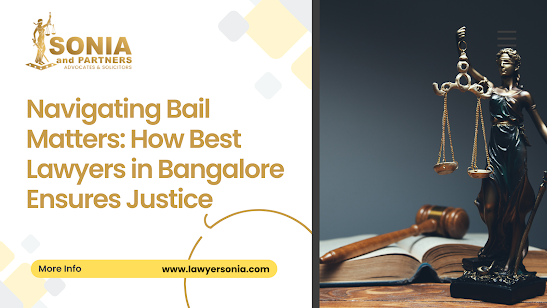Navigating Bail Matters: How Best Lawyers in Bangalore Ensures Justice
Introduction:
In the realm of legal proceedings, bail matters stand as a crucial juncture where the scales of justice tip in favor of personal freedom. For individuals entangled in legal troubles, securing bail is often the first step towards reclaiming their lives. In the bustling city of Bangalore, a region known for its diverse legal landscape, the role of a proficient lawyer in managing bail matters cannot be overstated. In this blog, we delve into the expertise and strategies employed by the best lawyer in Bangalore when handling bail matters.
Understanding the Bail Process:
Before we delve into the strategies adopted by the top lawyers in Bangalore, it's imperative to comprehend the bail process itself. Bail is essentially the temporary release of an accused individual from police custody, pending a trial or further legal proceedings. It ensures that individuals are not subjected to unnecessary incarceration before they are proven guilty.
Expertise and Specialization:
The Criminal Lawyers in Bangalore, particularly when handling bail matters, possess a deep-rooted understanding of criminal law and a comprehensive knowledge of the Indian Penal Code. Their specialization allows them to navigate through intricate legal provisions, precedent cases, and procedural nuances to build a strong case for their clients' bail.
Customized Approach:
Each bail matter is unique, and the top lawyers in Bangalore recognize the importance of tailoring their approach to suit the specifics of the case. They meticulously analyze the circumstances surrounding the arrest, the severity of the alleged offense, the individual's criminal history (if any), and other relevant factors. This personalized approach enables them to craft a compelling argument that resonates with the judge or magistrate overseeing the bail hearing.
Gathering Evidence and Building a Strong Case:
Evidentiary support is the cornerstone of any effective legal argument. The best lawyer in Bangalore understands this and diligently collects evidence that supports the petitioner's case for bail. This might include presenting character references, employment records, family ties, and other factors that demonstrate the individual's ties to the community and their willingness to cooperate with the legal process.
Effective Communication:
A skilled lawyer not only excels in courtrooms but also possesses exceptional communication skills. When seeking bail, effective communication is essential to convey the petitioner's intent to comply with legal proceedings and to assure the court that releasing them on bail will not jeopardize the case or public safety.
Negotiation and Strategy:
In some instances, negotiation can play a pivotal role in securing bail. The best Criminal lawyers in Bangalore employ strategic negotiation skills to engage with the prosecution, presenting arguments that highlight the merits of releasing the accused on bail. This could involve demonstrating the weak evidence against the accused, proposing stringent conditions for their release, or offering compelling reasons for granting bail.
Familiarity with Precedent Cases:
Legal precedents hold immense value in the world of law. A seasoned lawyer is well-versed in leveraging past cases that align with their client's situation to bolster their argument for bail. By drawing parallels between previous judgments and the present case, the lawyer can effectively persuade the court to grant bail.
Courtroom Proficiency:
Ultimately, when the bail matter reaches the courtroom, the lawyers with expertise in criminal matters display a remarkable courtroom demeanor. They exude confidence, succinctly presenting their case while addressing any queries from the judge or prosecution. This confidence stems from their in-depth preparation, mastery of the legal framework, and commitment to their client's cause.
Anticipatory Bail vs. Regular Bail: Understanding the Differences
Bail, whether anticipatory or regular, is a legal remedy that allows an accused individual to secure their release from custody while awaiting trial or further legal proceedings. However, there are key differences between anticipatory bail and regular bail that pertain to their purpose, application process, and conditions. Let's explore these differences in detail:
1. Purpose:
• Anticipatory Bail: This type of bail is sought in anticipation of an arrest. It is a proactive measure taken by an individual who believes that they may be arrested for a non-bailable offense. The purpose is to prevent unnecessary detention and harassment before actual arrest.
• Regular Bail: Regular bail is sought after an individual has been arrested and is in custody. It is a request for release pending trial or legal proceedings.
2. Timing:
• Anticipatory Bail: As the name suggests, anticipatory bail is sought before the arrest. It is a preventive measure taken to secure protection against potential arrest.
• Regular Bail: Regular bail is sought after the arrest has already taken place.
3. Application Process:
• Anticipatory Bail: To obtain anticipatory bail, an individual files an application before the actual arrest. The application outlines the reasons for seeking bail and presents arguments to convince the court that the applicant's arrest is likely due to a misunderstanding or false accusation.
• Regular Bail: After the arrest, the individual or their legal representative can apply for regular bail. The application typically includes grounds for seeking bail, such as the absence of strong evidence, health concerns, or other compelling reasons.
4. Legal Standard:
• Anticipatory Bail: The legal standard for granting anticipatory bail is higher. The court needs to be convinced that the applicant has a reasonable apprehension of arrest and that such arrest is not warranted based on the available evidence.
• Regular Bail: The standard for regular bail varies, but generally, the court assesses factors such as the nature of the offense, and the strength of the evidence.
5. Conditions and Restrictions:
• Anticipatory Bail: The court may impose certain conditions while granting anticipatory bail, such as requiring the applicant to cooperate with the investigation, refraining from influencing witnesses, and attending court hearings.
• Regular Bail: Similar conditions may be imposed for regular bail, but they can vary based on the specifics of the case.
6. Duration:
• Anticipatory Bail: Once granted, anticipatory bail remains in effect until the conclusion of the case, unless the court decides to cancel it.
• Regular Bail: Regular bail is generally granted for a specific period and needs to be renewed if the trial extends beyond that period.
Anticipatory bail is a precautionary measure sought before an arrest to prevent unjustified custody, while regular bail is applied for after an arrest to secure release during legal proceedings. Both types of bail aim to balance an individual's right to personal liberty with the interests of justice.
Conclusion,
The bail process stands as a critical stage within the broader legal framework. Lawyers in Bangalore for Bail adeptly handle bail matters by capitalizing on their expertise, specialization, customized approaches, evidence gathering, effective communication, negotiation skills, and familiarity with precedent cases. Their proficiency in these aspects empowers them to navigate the intricacies of bail proceedings and work towards achieving justice for their clients.
Contact us :
phone at +91-9845944896
email us mail@lawyersonia.com
Website: https://www.lawyersonia.com


.png)
Comments
Post a Comment